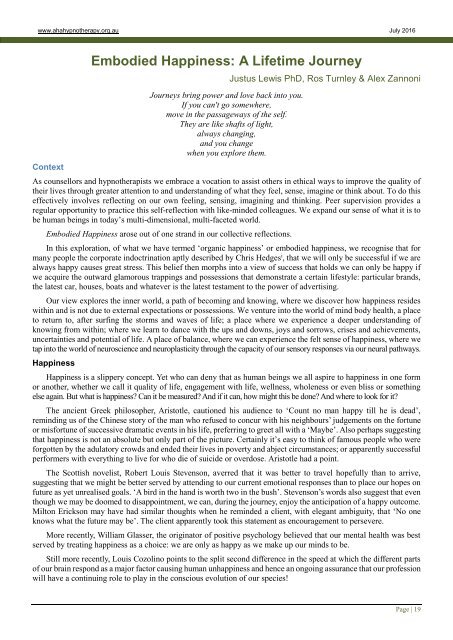The Australian Hypnotherapy Journal
296nlgS
296nlgS
Create successful ePaper yourself
Turn your PDF publications into a flip-book with our unique Google optimized e-Paper software.
www.ahahypnotherapy.org.au July 2016<br />
Context<br />
Embodied Happiness: A Lifetime Journey<br />
Journeys bring power and love back into you.<br />
If you can't go somewhere,<br />
move in the passageways of the self.<br />
<strong>The</strong>y are like shafts of light,<br />
always changing,<br />
and you change<br />
when you explore them.<br />
Justus Lewis PhD, Ros Turnley & Alex Zannoni<br />
As counsellors and hypnotherapists we embrace a vocation to assist others in ethical ways to improve the quality of<br />
their lives through greater attention to and understanding of what they feel, sense, imagine or think about. To do this<br />
effectively involves reflecting on our own feeling, sensing, imagining and thinking. Peer supervision provides a<br />
regular opportunity to practice this self-reflection with like-minded colleagues. We expand our sense of what it is to<br />
be human beings in today’s multi-dimensional, multi-faceted world.<br />
Embodied Happiness arose out of one strand in our collective reflections.<br />
In this exploration, of what we have termed ‘organic happiness’ or embodied happiness, we recognise that for<br />
many people the corporate indoctrination aptly described by Chris Hedges i , that we will only be successful if we are<br />
always happy causes great stress. This belief then morphs into a view of success that holds we can only be happy if<br />
we acquire the outward glamorous trappings and possessions that demonstrate a certain lifestyle: particular brands,<br />
the latest car, houses, boats and whatever is the latest testament to the power of advertising.<br />
Our view explores the inner world, a path of becoming and knowing, where we discover how happiness resides<br />
within and is not due to external expectations or possessions. We venture into the world of mind body health, a place<br />
to return to, after surfing the storms and waves of life; a place where we experience a deeper understanding of<br />
knowing from within; where we learn to dance with the ups and downs, joys and sorrows, crises and achievements,<br />
uncertainties and potential of life. A place of balance, where we can experience the felt sense of happiness, where we<br />
tap into the world of neuroscience and neuroplasticity through the capacity of our sensory responses via our neural pathways.<br />
Happiness<br />
Happiness is a slippery concept. Yet who can deny that as human beings we all aspire to happiness in one form<br />
or another, whether we call it quality of life, engagement with life, wellness, wholeness or even bliss or something<br />
else again. But what is happiness? Can it be measured? And if it can, how might this be done? And where to look for it?<br />
<strong>The</strong> ancient Greek philosopher, Aristotle, cautioned his audience to ‘Count no man happy till he is dead’,<br />
reminding us of the Chinese story of the man who refused to concur with his neighbours’ judgements on the fortune<br />
or misfortune of successive dramatic events in his life, preferring to greet all with a ‘Maybe’. Also perhaps suggesting<br />
that happiness is not an absolute but only part of the picture. Certainly it’s easy to think of famous people who were<br />
forgotten by the adulatory crowds and ended their lives in poverty and abject circumstances; or apparently successful<br />
performers with everything to live for who die of suicide or overdose. Aristotle had a point.<br />
<strong>The</strong> Scottish novelist, Robert Louis Stevenson, averred that it was better to travel hopefully than to arrive,<br />
suggesting that we might be better served by attending to our current emotional responses than to place our hopes on<br />
future as yet unrealised goals. ‘A bird in the hand is worth two in the bush’. Stevenson’s words also suggest that even<br />
though we may be doomed to disappointment, we can, during the journey, enjoy the anticipation of a happy outcome.<br />
Milton Erickson may have had similar thoughts when he reminded a client, with elegant ambiguity, that ‘No one<br />
knows what the future may be’. <strong>The</strong> client apparently took this statement as encouragement to persevere.<br />
More recently, William Glasser, the originator of positive psychology believed that our mental health was best<br />
served by treating happiness as a choice: we are only as happy as we make up our minds to be.<br />
Still more recently, Louis Cozolino points to the split second difference in the speed at which the different parts<br />
of our brain respond as a major factor causing human unhappiness and hence an ongoing assurance that our profession<br />
will have a continuing role to play in the conscious evolution of our species!<br />
Page | 19


